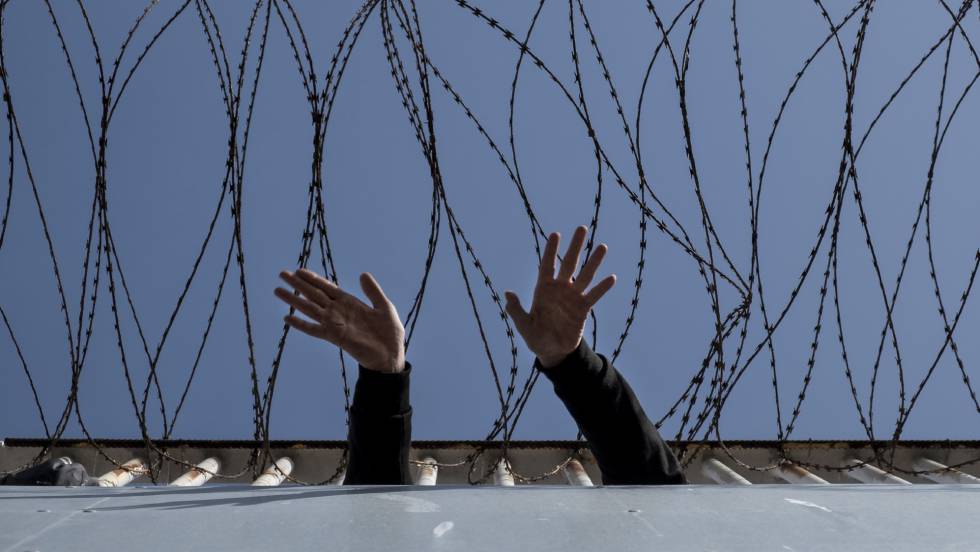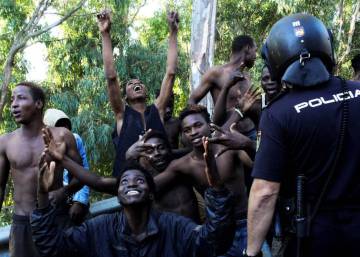Council of Europe slams conditions for migrants in Spain’s exclave cities
Report from Special Representative Tomáš Boček calls for an end to express deportations at Ceuta and Melilla and “legal and safe access” to the peninsula
Madrid

A migrant holding center in Ceuta. PEDRO ARMESTRE / SAVE THE CHILDREN EUROPA PRESS
The Council of Europe’s Special Representative on Migration and Refugees, Tomáš Boček, has criticized Spain in a report after visiting the country, which is currently in the midst of a migration crisis. “It is necessary that the Spanish authorities ensure that CETIs [migrant holding centers] in Ceuta and Melilla have the same standards in terms of living conditions, education, health care, language and training courses which asylum-seekers are entitled to and receive in mainland Spain,” he said, in reference to Spain’s exclave cities in North Africa.
The report calls for “immediate measures to ensure accommodation in appropriate conditions” for unaccompanied minors
In his report, the special representative also condemned the “express deportations” that Spain has carried out at the Ceuta and Melilla borders – i.e. sending migrants straight back to Morocco, instead of processing them in Spain – as well as the difficulty that Sub-Saharan migrants have in entering Spain legally.
The special representative, who was in Spain between March 18 and 24 of this year, visited two refugee centers in the peninsula. Known by their Spanish acronym CAR, the centers are run by the Labor, Migration and Social Security Ministry. He was surprised by what he found at the Valencia and Madrid facilities, underscoring the good conditions for refugees and asylum seekers, and the support they were offered to learn Spanish.
In contrast, he drew attention in his report to the conditions in Melilla and Ceuta, including those for unaccompanied minors. The installations are “heavily overcrowded,” he wrote in his report.
In Ceuta and Melilla, Boček found that the CETI there – also run by the aforementioned ministry – held asylum seekers fleeing from wars or persecution in their countries, as well as irregular migrants, who have to wait up to a year before they are transferred to the peninsula. Also present in the centers were mothers with children from different families, his report notes. The ambassador stated that the centers were at maximum capacity, and that the “standards of accommodation were inadequate,” and below those of the centers in the peninsula.

The report calls on the Spanish authorities to take “immediate measures to ensure their accommodation in appropriate conditions” for unaccompanied minors in Ceuta and Melilla. Boček details a situation in centers of “overcrowded conditions,” with children sleeping on mattresses on the floor.
Given that the conditions “expose [children] to sexual abuse, violence and human trafficking,” he continues in his report, “measures should be taken to include them in the child-protection system of the country.”
Boček was also concerned about the restrictions to freedom of movement applied to the migrants. The ambassador found that, while Ceuta and Melilla form part of the Schengen area, asylum seekers and irregular migrants were unable to travel to the peninsula without permission from the National Police. These restrictions on asylum seekers are “questionable,” writes Boček in his report, on the basis that the European Convention on Human Rights guarantees freedom of movement.
At the Ceuta office, the Spanish authorities explained that not a single asylum request had been presented since 1993
During his visit, the secretary focused on the two asylum offices in Ceuta and Melilla, which, in theory, allow for asylum seekers to enter Spain. But one detail caught his attention: barely any Sub-Saharan Africans request international protection. “At the Beni Enzar border crossing point in Melilla we were informed that the persons who crossed the border in a regular manner in order to seek asylum are mostly Syrians, Palestinians, Algerians or nationals of other Northern African countries,” the report states. When he made his visit, there were around 700 asylum requests pending, with a “rather high” acceptance rate of 90%.
At the Ceuta office, however, the Spanish authorities explained that not a single asylum request had been filed since 1993. “A number of reports have underlined that persons from sub-Saharan Africa are effectively prevented by Moroccan authorities from approaching regular border crossing points, notably in Melilla,” the report states. “Consequently, they do not have access to the asylum procedure.”
The ambassador criticizes the fact that there are no legal means for proper access. “Without any possibility for legal and safe access to the Spanish territory, persons from sub-Saharan Africa, including women and young children, turn to organized crime networks, hiding in cars or embarking on rafts to gain access to the autonomous cities of Melilla and Ceuta, thereby exposing themselves to risks of trafficking in human beings, violence and sexual abuse.”
“Managing mixed migration flows is a challenge for all member states, including Spain. Yet it is possible that responses reconcile border control and security on one hand and the protection of human rights of migrants and refugees on the other hand in compliance with Council of Europe standards,” the special representative said in his report.
English version by Simon Hunter.












.png)



























No hay comentarios:
Publicar un comentario